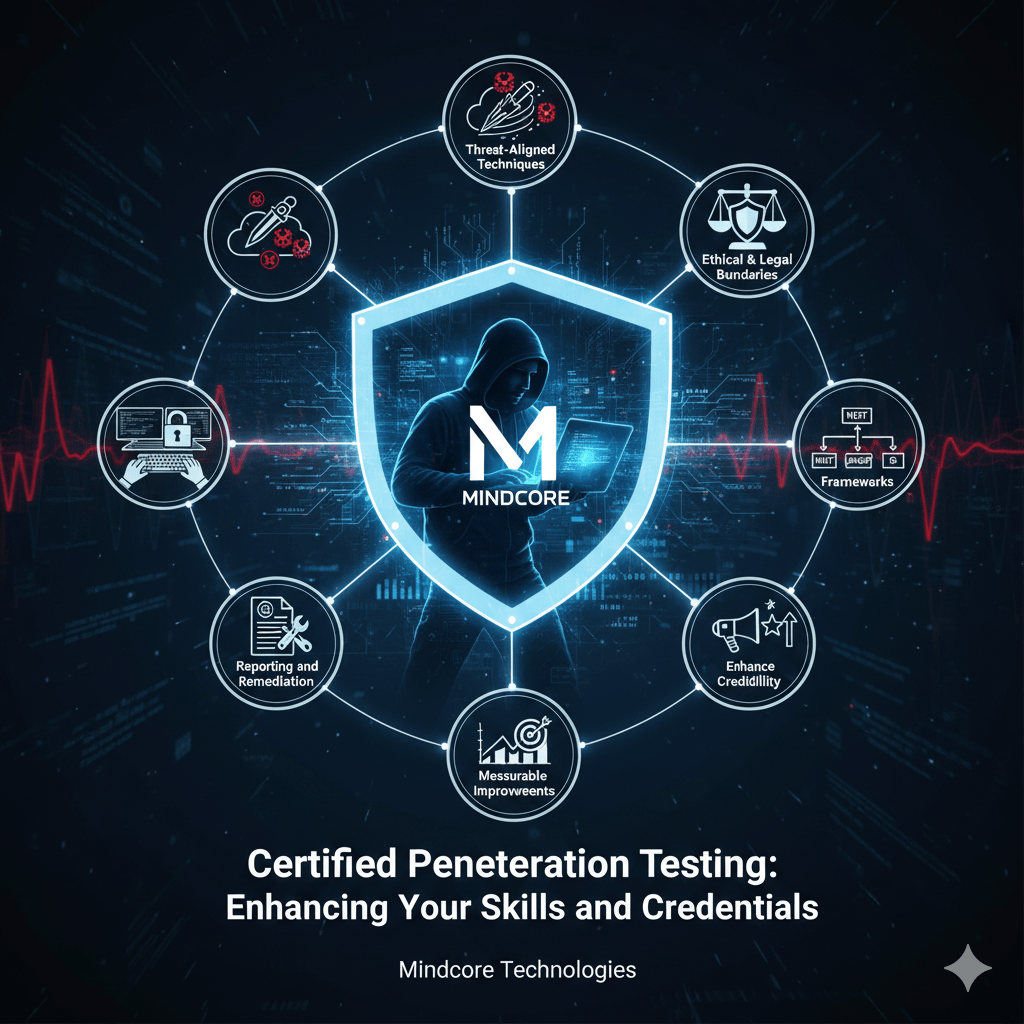(Updated in 2026)
If your penetration testing skills and certifications are static or checkbox-oriented, you are underserving your organization’s risk posture. Certification isn’t about adding letters after your name — it’s about building measurable capability to find, exploit, and help remediate real-world attack paths. Without continuous learning, credentialing, and hands-on validation, even experienced professionals miss enterprise exposure points that matter most.
At Mindcore Technologies, we invest deeply in advanced penetration testing training and certification because we know this: skills without context don’t protect systems — applied capability does.
Why Certification Matters in Penetration Testing
Penetration testing is not a theoretical discipline. It is an operational risk control that must reflect real adversary behavior, evolving tools, and defensive countermeasure knowledge. Certifications matter because they demonstrate competency in:
- Technical proficiency with tools and exploit frameworks
- Methodological rigor aligned to established frameworks
- Ethical and legal guardrails in controlled testing
- Interpretation of results into defensible actions
- Integration of findings into security and operations workflows
Without a structured certification path, assessments become inconsistent, shallow, or merely compliance-oriented — and ineffective.
1. Stay Current With Threat-Aligned Techniques
Threat actors constantly evolve. Credential stuffing, MFA bypass attempts, lateral movement tooling, and supply-chain exploits are no longer edge cases — they are standard. Certifications expose practitioners to:
- Updated adversary simulation techniques
- Defensive evasion strategies
- Advanced exploitation patterns
- Cloud and hybrid environment testing
- Identity and session abuse models
This equips testers to challenge modern defenses — not outdated scans.
At Mindcore Technologies, we ensure our practitioners pursue certifications that reflect current threat behavior, not legacy methodologies.
2. Validate Skills With Hands-On Labs
Academic knowledge alone doesn’t uncover blind spots. High-value certifications require practical labs, where testers exercise:
- Credentialed and non-credentialed access
- Privilege escalation scenarios
- Lateral movement simulations
- Network segmentation tests
- Web and API exploitation
- Identity abuse and access bypass techniques
Hands-on labs separate theory from defensible execution.
3. Develop Reporting and Remediation Advocacy
Finding a vulnerability is only half the job. A certified tester must translate technical findings into actionable remediation:
- Prioritized risk narratives
- Attack path descriptions
- Defensive countermeasure guidance
- Remediation impact statements
- Retesting validation plans
This is where real value is delivered — in reducing risk, not just listing issues.
At Mindcore Technologies, we embed remediation advocacy in every testing cycle, ensuring findings lead to measured reduction in exposure.
4. Support Ethical and Legal Boundaries
Penetration testing operates under ethical and legal constraints. Certified testers understand:
- Scope definition and enforcement
- Rules of engagement
- Data handling policies
- Legal compliance boundaries
- Disclosure protocols
Ethical competency prevents tests from becoming incidents themselves.
5. Align With Industry Frameworks and Standards
Certifications often map to industry frameworks (e.g., OWASP, NIST, OSSTMM), which helps:
- Standardize methodologies
- Communicate risk with stakeholders
- Enable peer validation
- Integrate testing into compliance workflows
This allows penetration testing to be a repeatable, governed discipline in your security program.
6. Enhance Credibility With Leadership and Peers
Certified professionals:
- Communicate findings with authority
- Influence architectural and process changes
- Advocate for risk-aligned investments
- Work effectively with IT, security, and leadership
At Mindcore Technologies, our certified testers bridge technical insight with leadership impact, improving defensive posture across teams.
7. Drive Measurable Improvements Over Time
Certification is not a destination — it’s a measurement framework. When paired with:
- Continuous learning
- Periodic reassessment
- Retesting after remediation
- Cross-domain integration (identity, network, cloud)
you build a maturing security posture — not a static one.
How Mindcore Technologies Applies Certified Penetration Testing
At Mindcore Technologies, certification is part of a structured operational program that includes:
- Threat-modeled test plans tailored to your environment
- Identity and access abuse simulation
- Network segmentation and lateral movement probing
- Application and API exploitation aligned to business logic
- Human-integrated risk scenarios where applicable
- Priority-mapped findings with defensible remediation plans
- Retesting to verify defense improvements
- Integration of results into incident response workflows
- Evidence-ready reporting for compliance and governance
This approach turns certification from a credential into an operational capability that reduces exposure.
What You Should Do Next
If your penetration testing program lacks certified capability:
- Identify certifications aligned to current threat models (not legacy lists)
- Ensure hands-on lab requirements are part of credential paths
- Build internal pathways for continuous training
- Integrate certification goals into team performance expectations
- Align testing scope to identity, network, cloud, and application risk
- Require remediation prioritization and retesting validation
- Tie testing outcomes to measurable defense improvements
These steps elevate testing from a compliance task to an adaptive defensive discipline.
Final Thought
Certification in penetration testing is not about prestige — it is about operational maturity. In 2026, cyber risk will not be diminished by hope or audits. It will be reduced by capable defenders, validated methodologies, and continuous improvement.
At Mindcore Technologies, we embed certified expertise into our penetration testing practice so that your risk is not just scanned — it is actively reduced.
This is how modern organizations build confidence, resilience, and measurable security outcomes.

